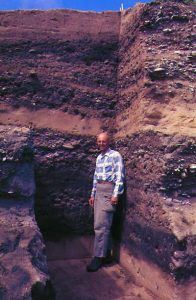Charles E. Rozaire Award for StudentResearch in California ArchaeologyRozaire Flyer
Dr. Charles E Rozaire As a young man during the 1940s, Charles Rozaire was an active volunteer at the Southwest Museum, working with Mark Harrington and others at various sites in western North America. Inspired by these experiences, he received his Ph.D. from UCLA in 1957, writing about ancient twined weaving techniques. Following his Ph.D., he worked at the Nevada State Museum until accepting a job at Natural History Museum in Los Angeles, where he spent the majority of his career (1963-1990). Rozaire made lasting contributions to California and maritime archaeology through his work on the California Channel Islands. The collections he made and his field notes continue to be an important source of research material for archaeologists today. Throughout his career, Rozaire spent significant time conducting archaeological fieldwork across California. He greatly valued these experiences, both socially and academically; and he wished there had been more funding to support field and laboratory projects during his career. This award is intended to promote such experiences among young archaeologists, and to bring greater attention to California’s rich past. The award supports undergraduate or graduate student research in California archaeology that includes a significant fieldwork or collections component. Funding from the award is intended to help pay for the various costs associated with fieldwork or analyzing an existing curated collection and/or for preparing the materials for long-term curation. The award is to promote original research on the material culture of all periods of California's history. ALLOWABLE EXPENSES Funding from the award (up to $2,000) may be used for fieldwork or collections expenses directly related to the study. These include travel to and from the field or museum; lodging, camping, and food to support a field crew; data collection; and/or the purchase or maintenance of minor field equipment (i.e., items under $300 such as shovels and screens). Expenses may also include initial stages of laboratory analysis associated with preparing the collection for further study and curation (e.g., illustrations or casting of artifacts, assistance with artifact or ecofact identification, purchase of curation supplies such as boxes or bags). Expenses not allowed include salary or stipends to field participants, tuition, or purchase of equipment over $300. HOW TO PREPARE YOUR RESEARCH PROPOSAL Complete proposals must include all of the following. Incomplete proposals will not be considered.
The research proposal should be no more than three pages, including: (1) research statement and design; (2) field or lab methods to be employed; (3) how the data to be gathered from fieldwork or museum work relate to the research design; (4) the significance of the site or area to California archaeology and Charles Rozaire's body of work; (5) objectives and scientific or educational significance of the proposed research; and (6) statement of approval or consultation by appropriate tribal entities for research focused on Native American archaeology. DEADLINES Applications are due by December 15 of each year. Applications will be reviewed by the committee, with the winner contacted by January 15 of the meeting year. The winner will be announced and honored at the Banquet at the annual meeting later that year. RECIPIENT’S OBLIGATIONS By accepting the award, the recipient commits to presenting a paper or poster at the following annual conference of the Society for California Archaeology and to submitting a version of this paper to the Journal of California Archaeology or the SCA Annual Proceedings. If additional papers are published in other venues, the recipient is asked to acknowledge financial assistance from the award. Submit your proposal to cer_student_award@scahome.org, with Rozaire Award Proposal in the subject line. 2026 Charles E. Rozaire Award for Student Research in California Archaeology |
2025 Jennifer Leiva, California State University, Los Angeles |
2024 Jeremy McFarland, University of Nevada |
2023 JILL EUBANKS, UNIVERSITY OF california, davis |
2022 Peter banke, university of nevada, reno |
2021 ALEC APODACA, UNIVERSITY OF california, BERKELEY |
2019 jESSICA MORALES, UNIVERSITY OF california, DAVIS |
2018 Kaitlin Brown, UNIVERSITY OF california, Santa Barbara |
2017 Nathan Acebo, Stanford University |


